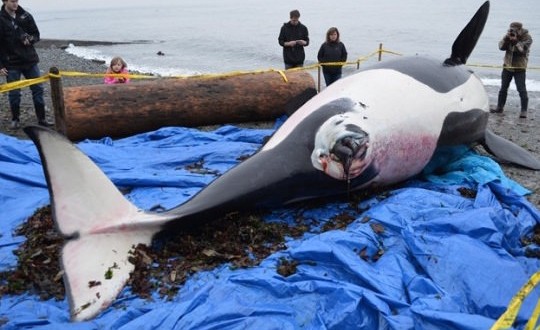The body of a young killer whale was discovered Thursday near Vancouver Island by residents of Courtenay, B.C., who towed it to shore.
Its death is troubling, said marine mammal researchers from the Vancouver Aquarium, as it marks the fourth recent death in the endangered southern resident population.
The death of the 18-year-old female, known to whale watchers and scientists as J-32, or “Rhapsody,” is believed to bring the total population of Southern Resident orcas down to 77 members.
“It’s always disappointing to lose an individual from an endangered population, but in this case it’s sort of doubly disappointing because the member that died is an 18-year-old female,” said Dr. Peter Ross, a senior scientist at the Vancouver Aquarium.
“It couldn’t be much worse than losing an 18-year-old female,” Ross said. “This was a female who was at the sunrise of her reproductive life.”
It’s not known how high the Southern Resident population would have been historically, Ross said, but their numbers have seen a “steady decline” over the last 15 years or so, when there were about 100 of them in the Georgia Strait, Juan de Fuca Strait and Puget Sound.
After the whale was spotted around 1 p.m. Thursday off a beach near Courtenay, it was towed to shore with the help of George Bates, co-owner of the nearby Bates Beach Oceanfront Resort.
Bates, who is also a former employee of the Department of Fisheries and Oceans, said the campers at the resort were “pretty upset, to say the least” to see his boat towing in the orca.
“It’s pretty traumatic,” he said.
Ken Balcomb, senior scientist and executive director of the Washington-based Center for Whale Research, Center for Whale Research said it seems “highly likely” that J-32 died while giving birth.
“As far as we know, she was pregnant, and the calf either died in utero or in the process of giving birth, and we will be able to find that out,” said Balcomb.
It has been at least two years since the birth of the last known surviving Southern Resident baby, he said.
“There’s virtually no survival of the babies anymore, which of course means there’s no future. And that’s pretty bad. We have to turn this around somehow,” said Balcomb.
A post-mortem examination is scheduled for Saturday to be led by Dr. Stephen Raverty, a veterinary pathologist from the B.C. government’s Animal Health Centre. The post-mortem will try to determine the cause of death and confirm whether or not J-32 was pregnant.
This was the fourth known death of a Southern Resident orca in 2014, according to a release by Orca Network.
The release said: “We cannot express how tragic this loss is for this struggling, precariously small family of resident orcas of the Salish Sea.”
Agencies/Canadajournal
 Canada Journal – News of the World Articles and videos to bring you the biggest Canadian news stories from across the country every day
Canada Journal – News of the World Articles and videos to bring you the biggest Canadian news stories from across the country every day



